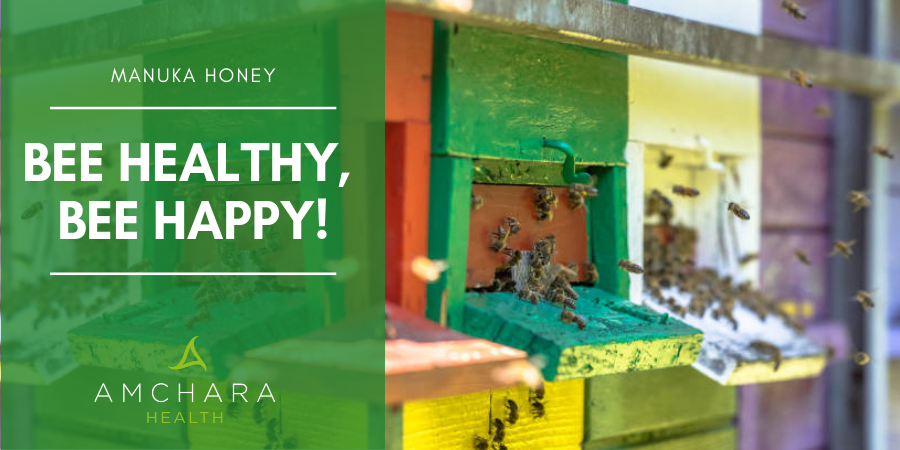Why choose Manuka honey to drizzle over your porridge in the morning?
After all, it’s so expensive!
As the old saying goes… ‘you get what you pay for’ and where health and vitality are concerned, Manuka honey delivers.
We always take an evidence-based approach and aim to provide you with actionable knowledge and tips to help you on your journey to optimal health.
In this article, we give you the low down on the surprising health benefits of this delicious sticky substance produced by the humble bumble bee.
Manuka Honey: Liquid gold, an elixir for good health
Manuka honey is native to Australia and New Zealand where it is produced from the Manuka bush (Leptospermum scoparium).
But what is it that makes it so special?
Scientists agree that Manuka honey has effective anti-microbial activities. These result from the production of hydrogen peroxide – a chemical made from glucose and oxygen.
This is facilitated by a bee derived enzyme called glucose oxidase.
Manuka honey is highly valued for its pharmaceutical properties and functional food merit, and while these are considered exceptional, there are many other honeys that offer similar qualities.
Honey, in general, is a natural product that is oozing with incredible health boosting compounds which have stood the test of time.
The Ancient Egyptians, Chinese, Greeks and Romans were known to use honey for its health benefits, particularly for treating intestinal problems. (1)
Humans have been using honey to fix wounds since time immemorial, so the discovery that it has natural antibacterial activity is not a surprise to traditional health practitioners.
And the benefits don’t stop there, multiple studies have confirmed the wide range of therapeutic effects of honey.
Honey has been found to contain over 200 distinct chemical substances, including vitamins, minerals and an enormous range of phenolic compounds that all have unique nutritional and medicinal properties. (2)
These constituents work harmoniously together, giving honey a whole range of practical applications.
Here are five reasons to keep a pot of Manuka honey in your kitchen cupboard!
#1.
Manuka honey is one of the most potent natural wound healers and has been investigated extensively.
Its potency is attributed to its ability to exert antibacterial effects against a range of pathogenic bacteria such as E coli, Salmonella, Shigella, Staphylococcus aureus and Helicobacter pylori. (2)
The antibacterial power of honey is significant. According to one study, a concentration of 30-50% honey was found to be superior to several commonly used antibiotics.
The honey effectively inhibited the growth of nine types of pathogenic bacteria isolated from the urine of a large group of patients with urinary tract infections. (6)
#2.
Research has also identified that honey has anti-yeast and anti-fungal properties making it an ideal remedy for Candida albicans, Aspergillus niger and Saccharomyces cerevisiae.
Manuka honey, in particular, is shown to have greater anti-fungal inhibitory effects on Candida albicans than other types of honey. (7)
Scientists believe that the biological anti-fungal activity is attributed to the phenolic components rather than the sugar in honey. (8)
#3.
Natural honey is valued for its many antioxidant properties and this is widely documented.
Several studies have identified that honey from a variety of regions around the world has significant antioxidant activity, due to its phenolic content. (3)
Antioxidants are substances that are essential for protecting cells of the body against free radical damage caused by unstable molecules called free radicals.
Oxidative damage can lead to premature ageing and a range of chronic diseases such as dementia, diabetes and cardiovascular disease. (4)
Whilst Manuka honey is famed for its antioxidant content, researchers have found that Mangosteen and Rambutan honey from Thailand display significantly higher levels of antioxidant activity. (3)
#4.
Manuka honey has the highest levels of vitamin C compared to other honeys, which is why adding a spoonful to your hot lemon drink can help to soothe a sore throat and ward off cold and flu symptoms.
There is strong evidence to support the view that vitamin C can shorten the duration and severity of cold symptoms.
Vitamin C is also a vital co-factor in the production of collagen, a necessary component of strong healthy skin.
Honey’s vitamin C content, combined with its antibacterial properties, can be credited for its ancient use as an effective wound healer.
#5.
According to research Manuka honey can be used as an anti-inflammatory agent.
Researchers have found that Manuka honey has biologically active compounds that trigger the production of anti-inflammatory chemicals.
Applying honey as a dressing for wounds stimulates the healing process and has been shown to rapidly clear infection.
Honey appears to cleanse the wound, stimulate the regeneration of new tissue and reduce inflammation around the injury. (5) (6)
Given the potential range of therapeutic uses for uncontaminated pure Manuka honey, it is currently underutilised, which is a shame because it is simple, safe to use and readily available.
There are many applications for Manuka honey, do you have any other suggested uses that have worked for you or someone you know?
Why not leave a comment and tell us all about it?
Jacqueline Newson BSc (Hons) Nutritional Therapy
READ THIS NEXT:





